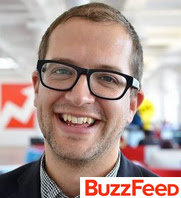|
|
Dear Colleagues:
News media organizations and reporters who cover news beyond the U.S. borders are navigating a changing world and do their jobs under enormous pressure.
In today's 24/7 news cycle, the operating arena is in constant flux with influences, obstacles, and opportunities generated by technology, citizen journalism, natural disasters, regional conflicts, and varied views of what constitutes freedom of speech and a free press.
This is such an important and timely topic that we will cover it in a two-part series. For this issue of Marketing Coach, I had the opportunity to interview Scott Lamb, VP of International at BuzzFeed and Delphine Halgand, USA Director at Reporters Without Borders.
Scott and Delphine were kind enough to share their first-hand experiences and observations with me on how news organizations are adapting and new ones are developing in response to the changing global environment, how stories are identified, how news is covered, and how those reporters travel into the field and back to headquarters safely.
In this issue we will share stories about covering the news in real-time in spots like Nairobi, Sydney and the Middle East.
Read on...
 |
|
|
|
|
|
|
|
|
|
Ivy Cohen: How has BuzzFeed built an international desk as a young digital media outlet?

Scott Lamb |
One of the big differences is that we are able to be more flexible and light weight with the way we approach international growth. If we were a newspaper trying to do the same thing 15-20 years ago, we'd need to get a printing press to produce the paper, set up distribution, and hire an all-local staff. There'd be a particularly large investment just to get started.
With digital media, the distribution part is taken care of so long as there are people on social media in different and new markets. The content tools are already there. Because BuzzFeed is global, anyone can access it, and we can write stories in multiple languages and put them on our own platform. We have focused on hiring people and identifying a co-working space with people in each country.
|
|
 |
|
Ivy: How is social media influencing news coverage?

Scott Lamb |
At BuzzFeed social media is not just a place to promote stories. It's where we find stories and where our readers distribute our stories. Our readers are our distribution. So, social media is central to everything we do. Facebook is essential because of its reach. Twitter is also incredibly important. Snap Chat is important because of its size. When we think about platforms, we think about how many people are using them.
|
|
 |
|
Ivy: How does Reporters Without Borders (RWB) help protect journalists around the world?

Delphine Halgand |
To assist journalists, we work every day on both the public and private levels. Assistance includes financial support to pay for lawyers and hospital bills. We lend out bullet proof jackets, helmets, and a Virtual Private Network (VPN). When persecuted, we help journalists find asylum in safe countries.
Last, but not least, RWB provides support to families of kidnapped journalists by helping them develop a strategy with the media to advocate for their loved ones and keep attention on them when their story moves to the back burner over time. Sometimes we work with the media to request an information blackout to protect a journalist, and other times we work with the media to implement a big awareness campaign. It depends on the individual needs and circumstances.
|
|
 |
|
Ivy: Who is providing news today?

Delphine Halgand |
We are in a unique time as a global community as we look at who provides us with news. Between the budget crises of traditional media, a diminished number of foreign correspondents, and the operation of Internet and social media, we have given power to citizens to tell us the news. They have the power to use their phone and computer and report on what is happening in real-time.
This has been especially visible during the Arab spring when citizens took advantage of the media to circulate ideas or share what was happening around them. In some cases, citizens have played a more important role as providers of information to professional journalists than ever before. Citizen journalists have become so prevalent, that they are now being targeted; there are actually more citizen bloggers and journalists in jail around the world than professional journalists. Some have even been killed. This is a tragic illustration of the important role they are playing to provide information.
Of course credentialed journalists still matter. Professional journalists are crucial because they are the ones who have to review all of this information that they gather from their sources - from citizen journalists and all other sources. The two types of journalists can be complementary.
In some countries, such as Vietnam, you have accredited professional journalists who are the voice of government propaganda. In other political environments and countries, independent news is supplied to the public by bloggers.
|
|
 |
|
Ivy: In times of crisis like the Ebola epidemic, how are you able to cover the news as it unfolds?

Scott Lamb |
The BuzzFeed coverage of Ebola in West Africa was all done on the ground from first-hand reporting. Our Nairobi correspondent lobbied to cover the story [Ebola] on the ground. She had solid contacts in the area. While we would never willingly want one of our correspondents to be harmed, we set up a solid infrastructure to keep her safe from the disease, like getting her protective gear to wear so she could visit hospitals. The focus of the coverage was about how Ebola was affecting the people there - the lives of the healthcare workers,those digging graves to bury the dead. Our reporter wanted the focus to be on the people on the ground...on those original first-hand stories.
The story she wrote about grave diggers shed light on an aspect of that whole story that no one else had covered.
|
|
 |
|
Ivy: How did BuzzFeed wind up on site to cover the terror at the Lindt Café in Sydney, Australia?

Scott Lamb |
For this story, it was happenstance that the Lindt Café was down the street from the BuzzFeed offices in Sydney. Before anything was up on social media, BuzzFeed staff noticed a heavy police presence in the downtown area of Sydney. Reporters approached the police and learned what was taking place. We coordinated information gathering from a distance to be ensure our staff was not in any danger.
BuzzFeed wanted to be respectful of the police who needed to do their work, and at the same time we wanted to get information on the story. The SWAT team established a perimeter early on and a safe zone was established. We were able to get official sources from the police and their public affairs arm, as well as from speaking to people in the crowd who might have seen what happened. The speed of social posts can build its own narrative, and sometimes the speed can be ahead of the situation on the ground. It's like a rapid game of "telephone." We have learned to be careful and skeptical about things that post on social media in a breaking news situation. It is important to have official sources and then verify any information you hear from social media.
|
|
 |
Marketing Coach is a publication of Ivy Cohen Corporate Communications, Inc.
ICCC helps companies build brands and differentiate in a competitive market
through public relations, strategic communications and content marketing.
To find out how ICCC can help you and your company build your reputation
Join our Mailing List I Twitter I Visit Our Website I Printable Version
|
| |
|
|
|
|
|
|
|